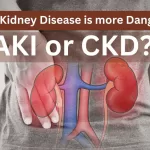Understanding Varicocele and Epididymitis: Differences and Implications
When it comes to male reproductive health, two conditions that often cause concern are varicocele and epididymitis. Though both can lead to discomfort and have implications for fertility, they are distinct in their causes, symptoms, and treatments. Understanding the differences between varicocele and epididymitis is crucial for effective diagnosis and management. This blog aims to provide a clear and comprehensive overview of these conditions in simple language, making it accessible and engaging for everyone.
What is Varicocele?
The term varicocele describes the growth of veins in the scrotum, which is comparable to varicose veins in the legs. The pampiniform plexus, which is made up of these veins, can swell and twist, causing a variety of symptoms as well as potential complications.
Varicocele develops when the valves inside the scrotum’s veins block blood flow. Instead of flowing smoothly, blood accumulates in the veins, causing them to enlarge. The specific reason why these valves fail is not completely understood. However, several factors may contribute, including:-
- Genetics: A family history of the condition can add to the risk.
- Physical activity: Strenuous activity or prolonged standing can exacerbate the condition.
- Anatomical factors: Certain structural features in the veins might make them more prone to dysfunction.
Varicocele symptoms include:-
- A dull, aching scrotal pain
- A feeling of heaviness or pulling in the scrotum.
- Visible enlarged veins, often described as a “bag of worms.”
- Discomfort that worsens when you move or stand for a long time.
- Problems with fertility since varicocele can affect the quantity and quality of sperm.
If there are no symptoms, treatment may be not necessary. For symptomatic situations, pain relief, supportive undergarments, and homeopathic treatment for varicocele to restore the veins are all available
What is Epididymitis?
The term “epididymitis” refers to inflammation of the epididymis, a tube that holds and transports sperm and is situated below the testicle. This illness can be caused by infections, such as sexually transmitted infections (STIs) or urinary tract infections (UTIs), as well as non-infectious reasons.
Epididymitis causes include:-
- Infections: The most frequent cause is bacterial infections. STIs such as gonorrhoea and chlamydia are common causes of infection in younger males. Epididymitis is frequently the result of UTIs or prostate infections in elderly men.
- Non-infectious causes: Trauma, autoimmune reactions, or certain medications can also cause epididymitis.
Epididymitis symptoms include:-
- Scrotal pain and soreness, sometimes very serious.
- Scrotal swelling and redness.
- Urination that is painful or urgent.
- Penis discharge, especially in cases when a STI is the cause.
- Chills and fever, which point to a possible systemic illness.
Epididymitis treatment typically involves epididymitis medication for bacterial infections, pain relief, and supportive care, such as rest and scrotal elevation.
Key Differences:
Although both varicocele and epididymitis can be discomforting conditions that affect the scrotum, there are important distinctions between the two in terms of their origin, symptoms, diagnosis, and treatment.
Causes:-
- Varicocele: Varicocele causes include defective valves in the veins, leading to improper blood flow.
- Epididymitis: Typically results from infections (bacterial, STI-related) or non-infectious reasons such as trauma.
Symptoms:-
- Varicocele: Oftentimes asymptomatic but can cause a dull ache, feeling of heaviness, and visibly swollen testicular veins.
- Epididymitis: Usually presents with sharp pain, swelling, redness, and systemic symptoms like fever.
Link with Fertility:
Varicocele and Fertility:-
Varicocele is a known cause of male infertility. The pooling of blood can raise the temperature in the scrotum, lowering sperm production and quality. Studies have demonstrated that treating varicocele can enhance the qualities of sperm and increase the likelihood of conceiving, either spontaneously or with assisted reproductive procedures.
Epididymitis and Fertility:-
Epididymitis, particularly when induced by an infection, can influence fertility. Infections can produce epididymal scarring and obstructions, resulting in obstructive azoospermia (a condition where no sperm is present in the semen). To avoid long-term problems, infections must be treated promptly.
Prevention and Lifestyle Considerations:
While certain risk factors for varicocele and epididymitis, such as genetic predisposition, are beyond our control, others may be treated by lifestyle modifications and preventative interventions.
Preventing Varicocele:-
- Routine physical check-ups to diagnose varicocele early
- Avoid prolonged standing and take gaps in between
- Wear supportive underwear to reduce discomfort and support the veins
Preventing Epididymitis:-
- Ensure safe sex by using protection and getting STI examinations to prevent infections
- Maintain proper personal hygiene to lower the risk of UTIs and infections
- Wear protective gear during sports and physical training to prevent scrotal injury
When to see a doctor:
If you notice any of the following, it’s essential to consult a healthcare provider:-
- Persistent or severe scrotal or testicle vein pain
- swelling or lumps in the scrotum
- Fever, chills, or penis discharge
- Infertility or difficulty conceiving
Conclusion:
Varicocele and epididymitis are two distinct conditions that affect the male reproductive system. Understanding their differences in causes, symptoms, and treatments can help in managing these conditions effectively. While varicocele often involves issues with blood flow in the scrotal veins, epididymitis is primarily related to infections and inflammation of the epididymis.
Awareness, early diagnosis, and appropriate treatment are key to mitigating the potential complications of these conditions. Whether it’s through lifestyle adjustments, preventive measures, or medical interventions, taking proactive steps can significantly improve outcomes for those affected by varicocele and epididymitis. If you experience symptoms related to either condition, seeking medical advice is crucial for maintaining reproductive health and overall well-being.
Treatment:
Bharat Homeopathy offers effective remedies for varicocele and epididymitis, providing a holistic approach to treatment. With our expertise in homeopathic medicine, we aim to address the root cause of these conditions and provide long-lasting relief. Our treatment plans are tailored to each patient’s individual needs, taking into consideration their specific symptoms, medical history, and overall health.
At Bharat Homeopathy, you can find specialised epididymitis and varicocele treatment without surgery. Our approach focuses on utilising the principles of homeopathy to stimulate the body’s natural healing abilities. By targeting the underlying factors and problems that contribute to these conditions, we aim to alleviate symptoms and promote overall well-being. With our comprehensive and natural treatment plans without testicular vein surgery, we strive to provide our patients with a safe, non-invasive and effective alternative to conventional medicine.


